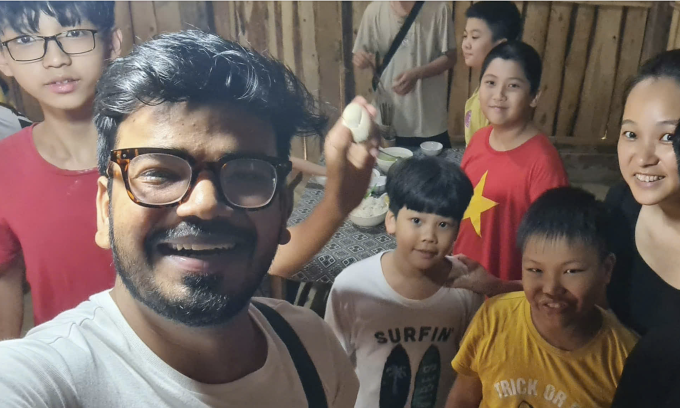Foreign travelers find themselves enamored into volunteering by Vietnam culture
A few months after graduating from high school, Mara packed her bags and flew solo from Berlin to HCMC to begin a year-long volunteer experience.
Through the Worldpacker app, she found a job teaching English five days a week at a center in Binh Thanh District.
“My friends told me about how friendly Vietnamese people are,” she says.
When she decided to take a gap year to travel around Southeast Asia, her parents suggested she should volunteer to immerse herself in local life and understand other cultures.
Despite her excitement, Mara felt nervous when facing a class of 30 students for the first time. Assigned to a group of five, she helped a student with pronunciation errors and guided the group in vocabulary and sentence construction to describe Vietnam’s landscapes.
“They were friendly, and we had great lessons. I also learned a lot from them.”
Mara’s students shared tips about nightlife in HCMC, helped her accustom to rush-hour traffic and taught her a few basic phrases to ask for directions.
“These are things I would never have experienced if I had just traveled as a tourist.”
Sam Mittal took a photo with the children in Sa Pa in northern Vietnam during his visit in June 2023. Photo courtesy of Sam Mittal |
Sam Mittal, a 34-year-old Briton of Indian extraction, has returned to Vietnam in summer for the last two years.
In 2019 he had embarked on a road trip from north to south with a group of friends.
During a stop in Can Tho City in the south, a family helped fix his motorbike for free and even gave him a bag of mangoes.
“I was surprised as I had never received such kindness in the 51 countries I had visited,” he says.
“Vietnamese are warm-hearted.”
In the summer of 2022, Sam teamed up with a Vietnamese architect to volunteer in Sin Chai Village in Lao Cai Province in northern Vietnam. They gathered a group of children, aged five to 15, and taught them English. Their class, which ran for six weeks, focused on communication, pronunciation and sentence structures.
Every morning Sam would ride from Sa Pa to the village, carrying candy and books for the students. Some children had no English knowledge while others could read a few sentences, and so he divided them into smaller groups for tailored lessons.
Over time even some adults began attending the classes.
By the end of the program, several students could communicate in basic English, and Sam felt a sense of fulfillment.
He returned to the village in winter 2023 to organize a Christmas party for the children.
Mara and Sam are part of the voluntourism movement, which combines volunteering with travel.
This movement, which started in the 2000s in the U.S., focuses on social activities like teaching English, conservation efforts, house building, and animal care.
A survey by Marriott Rewards Credit found that 84% of Millennials (born between 1981 and 1990) have done or are currently involved in voluntary work abroad.
The Global Voluntourism Market Report estimated that the voluntourism industry was worth around US$1.2 billion in 2023.
In 2024 Volunteering Solutions, an organization offering international volunteer programs, ranked Vietnam in the top 10 ideal destinations for two- to four-week volunteering stints, with recommendations including caring for children and teaching English.
Libby Homfray, director of Laws for Paws Vietnam, which rescues and cares for dogs and cats, says 80% of the non-profit’s volunteers are foreigners.
It gets 80-100 volunteers each month, with the number increasing over the last two years.
 |
Carmen Le Roux shares a moment with one of the rescued dogs in Thu Duc City, HCMC. Photo courtesy of Carmen Le Roux |
Among the volunteers at Laws for Paws is South African Carmen Le Roux, who came to Vietnam during the Covid-19 pandemic. She was impressed by how Vietnamese people supported each other with food donations and free transport during the pandemic, inspiring her to stay.
“I love the culture of giving and receiving here, something I haven’t seen much of in other countries,” she says.
“Vietnamese people are willing to give their time and effort.”
Carmen and her then-boyfriend (now husband) were surprised to see people waking up early to feed the dogs, clean the kennels and then head to work.
Inspired by this dedication, Carmen began volunteering to care for the animals, organize visits for school children in HCMC and assist with the organization’s communication efforts.
She spends four hours a day volunteering and visits the rescue center on weekends, and, along with her main job, this leaves little time for rest.
In early September she led a group of students on a tour of the rescue center and witnessed a moment where a child petted a dog’s fur.
“At that moment I felt a sense of calm, and all my fatigue melted away.”


Comments are closed.